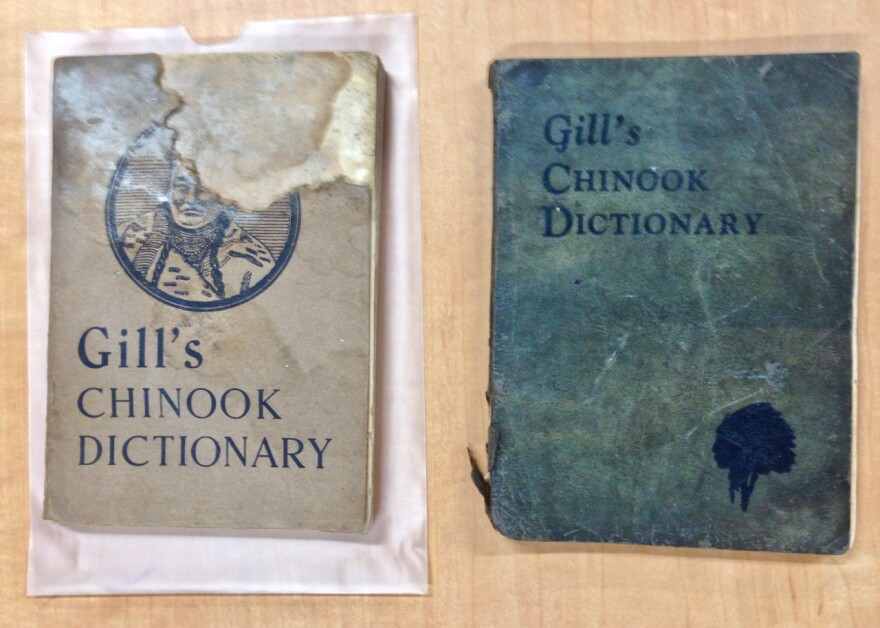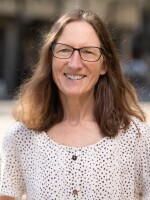All nine Oregon tribes have Cultural Resources departments. Some have archaeologists on staff, others have museums or archives. In recent years, the number of donations of cultural artifacts is soaring. Here's the next installment of our “Native Oregon Voices” series.
A friend had a Chinook / English dictionary from the 1930s and hoped I could get it back to where it belonged. Chinook was a trading dialect for Indians as well as settlers. I contacted the Confederated Tribes of Grand Ronde and brought the donation to them.

Edwards: "This is an example of adaptive re-use of a middle school.”
Historic Preservation Manager Briece Edwards shows me his offices. Some of them were completed last year.
Edwards: “Just past these doors, we're into new build.” [beeping]
We're now in the vault area. Edwards tells me they'll scan the content of the dictionary. The physical copy will be held as a rare book.
Edwards: “The obligations of the tribe are to care for that belonging, that object, forever.”

Grand Ronde has nine employees in historic preservation and collections. There are several labs with instruments for chemical analysis, 3D scanners, and microscopes. Tribal assets like these are relatively new. Thomas Connolly is an archaeologist with the University of Oregon.
Connolly: “That was something that has developed during the last probably 20 years. When I started doing this work, the tribes really didn't have a professional staff.”
Connolly is excited to work collaboratively with the tribes. He often consults with them when construction uncovers artifacts. The 1906 Antiquities Act protects historic objects on government land. Oregon has three laws:
Pouley: “One of them basically says that a person cannot damage, alter or destroy a significant archaeological site.”

John Pouley is Oregon's Assistant State Archaeologist. He says permits are required for construction on land with archaeological objects. He wants people to understand private land will never be seized if artifacts are found on it, and also:
Pouley: “Private landowners have to give permission for an excavation to be done on their property and any artifacts cannot be sold exchanged, bartered, traded without their permission.”
If something like an arrowhead is discovered on public land, Pouley says, people should leave it there and contact a tribe, university or archaeological company.
Pouley: “If you think of a crime scene, if somebody tampers with it, then you lose a lot of the context, that's the same way with an archaeological site.”
Context matters for ancient objects. All I knew about the dictionary was it was found in a house near the coast. Edwards wanted more. Who lived there? What was the address? He says archaeology is often about identifying things in a place.
Edwards: “At the end, that just gives you a bunch of nouns. A tribal perspective can bring in practice, and an understanding of whys, which give you the verbs. So together, you now can have a more complete sentence.”

The story is important for tribal members because so much was lost. Michael Rondeau is CEO of the Cow Creek Band of Umpqua Tribe of Indians. He says when people were moved to reservations, they were stripped of their land and often their language and traditions.
Rondeau: “A lot of the cultural things got either hidden or abandoned because of inability to practice.”
He sites burial grounds that have been raided by collectors. State archaeologist Pouley says these days, most landowners want to do the right thing:
Pouley: “People find it interesting that, wow, I have this connection on my land and somebody can actually get some information from it before I build my shed.”

Grand Ronde's Cultural Resources Manager David Harrelson says donations have increased lately—even with the specific book I brought in. They have one other copy and it also just arrived:
Harrelson: “Something must be going on because they're coming home.”
He thinks it's partially because their museum expanded in June.
Harrelson: “We're on people's radars and so they're stopping by. People walk in off the street and just make donations.”
Connolly, with U of O says too, sensibilities have changed:
Connolly: “There was a time when going out and digging up Indian sites with your Boy Scout troop or as a family recreation, was a thing. And it's not now.”
It's a collaborative effort to unearth lost stories. Connolly says public agencies play a big part:
Connolly: “In fact, ODOT probably sponsors more archaeological research than any other agency.”

He says roads are where they are, so when ODOT finds an artifact, it has to be addressed. He's currently cataloging hundreds of items uncovered while making a new Columbia River trail. To anyone who would criticize how state funds are used, Cow Creek's Rondeau says:
Rondeau: “In a society where we're supposed to at least look out for each other, details like burials and culture matter.”
He's happy casino profits have given tribes the ability to do this work.
Rondeau: “They're able to now put more resources toward the restoration of our culture and our languages.”
His tribe employs two archaeologists, but they want to grow the department. Grand Ronde's Harrelson says their emphasis on artifacts is unique.
Harrelson: “We're sort of on the leading edge of a lot of these things and so, there isn't a manual on how to do this. We're literally coming up with the protocols, procedures as we move forward. And so it always feels daunting but it's also very rewarding.”
These are early days for Oregon's tribes' cultural work, but indications are their resources will increase, and more pieces of history will continue to be brought back to where they belong.
Funding for KLCC's "Borders, Migration, and Belonging" series is provided by the Wayne Morse Center for Law and Politics and the University of Oregon.






